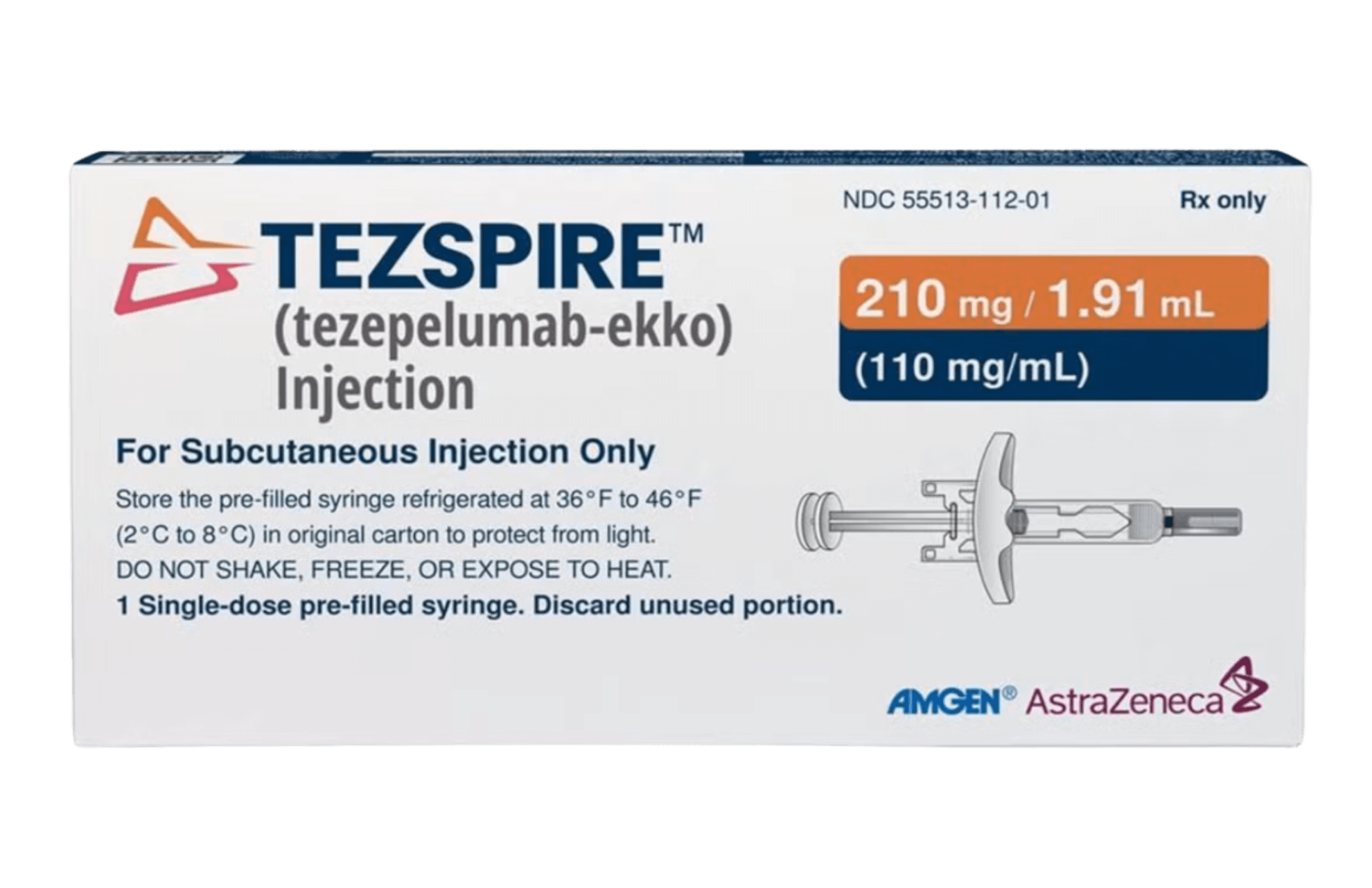Tezspire (generic name: tezepelumab) can be prescribed to treat severe asthma in adults and adolescents aged 12 years and older whose asthma is not adequately controlled by their current inhaled treatments. It is a biologic medicine belonging to the pharmacological class of thymic stromal lymphopoietin (TSLP) blockers, a type of monoclonal antibody that works by interrupting the early immune-driven signalling that leads to airway inflammation.
By targeting TSLP, tezepelumab aims to reduce the underlying inflammation in the airways that causes symptoms such as wheezing, chest tightness, shortness of breath, and night-time awakenings. The treatment is designed for regular ongoing use as add-on therapy rather than for relief of sudden asthma attacks. It is delivered via subcutaneous injection once every four weeks and supplements the patient’s existing asthma regimen.
With consistent use, Tezspire can help decrease the frequency of flare-ups, reduce the need for rescue medicines, and improve overall asthma control and quality of life. Because it acts on the immune pathway upstream of multiple inflammatory signals, it may benefit a broader group of patients—including those without specific blood biomarker profiles—than some older biologic therapies. Nevertheless, its use should always involve specialist oversight given the complexity of biologic treatment and the potential for serious risks.
Dosage
It is important to follow the dosage instructions printed on the label of the box. Check with a doctor or pharmacist if there are any doubts regarding the proper dosage and treatment regimen.
Tezspire is administered as a 210 mg subcutaneous injection once every 4 weeks in adults and adolescents aged 12 years and older. The injection may be given by a healthcare provider or by the patient/caregiver after appropriate training, depending on the formulation approved locally. The first dose may also be given earlier depending on local guidelines. The dose remains the same over time; once stability is achieved the healthcare provider will monitor and determine whether continued use is appropriate.
If a scheduled dose is missed, it should be given as soon as possible and the regular four-weekly schedule resumed. Do not take a double dose to make up for a missed dose. The medicine must be used in addition to the patient’s existing asthma therapies, and existing inhalers should not be stopped abruptly without specialist advice when using Tezspire.
Storage
-
Store Tezspire in a refrigerator between 36-46°F (2-8°C) in its original carton to protect it from light until you are ready to use it.
-
It can be removed from the cold to room temperatures (15–30°C / 59–86 °F) immediately before use.
-
Protect from direct sunlight, freezing temperatures, and excessive heat.
-
Keep the product in its original container (prefilled syringe or pen) until use.
-
Keep out of reach of children.
-
Do not use the product after the expiry date printed on the packaging; the expiry date refers to the last day of the printed month.
This text is for informational purposes only. Please consult a doctor or pharmacist before using any medication.
The patient information leaflet that comes with the medication includes full information about the correct usage, storage and possible side effects. Be sure to read and understand these, and if there are any questions, discuss them with a healthcare provider or pharmacist before starting treatment.
Most people who use Tezspire do not experience any adverse side effects. Doctors prescribe this medication because they assess the benefits outweigh the possible risks.
Caution:
If a sudden allergic reaction (anaphylaxis) occurs shortly after taking Tezspire, with symptoms like swelling of the face, tongue, or throat that make it difficult to breathe or swallow, or there is wheezing, hives, rash, blistering, or peeling of the skin, call a doctor or emergency services right away.
Common side effects:
-
sore throat (pharyngitis)
-
joint pain (arthralgia)
-
back pain
-
injection-site reactions (such as redness, swelling or itching)
-
upper respiratory tract infections (e.g., common cold)
Serious side effects requiring immediate action:
-
severe allergic reactions or anaphylaxis (see caution above)
-
infection requiring hospitalisation or serious opportunistic infections
-
sudden worsening of asthma symptoms, including more frequent flare-ups requiring oral steroids or hospital care
-
new or worsening cardiovascular problems (such as chest pain or shortness of breath)
Not all side effects are listed here. If these or other unlisted symptoms persist or worsen, consult a healthcare provider or pharmacist.
Tezspire is approved for the maintenance treatment of severe asthma in adults and adolescents aged 12 years and older whose symptoms are not adequately controlled despite high-dose inhaled corticosteroids plus another controller medication.
Typical symptoms of severe asthma include:
-
wheezing (whistling or squeaking sound when breathing)
-
chest tightness (a feeling of pressure or constriction in the chest)
-
shortness of breath (difficulty breathing during activity or at rest)
-
night-time awakenings due to asthma symptoms
-
frequent use of rescue inhalers or repeated flare-ups requiring oral corticosteroids
In severe asthma, airway inflammation is persistent and may not respond adequately to standard inhaled therapies alone. Tezspire helps by modifying the upstream inflammatory cascade rather than simply relaxing airway muscles.
By adding Tezspire to standard therapy, the aim is to reduce the frequency of exacerbations and hospitalisations, improve lung function and symptom control, and support overall daily functioning and quality of life. Its role is as a long-term maintenance biologic, not an emergency treatment for acute asthma attacks.










